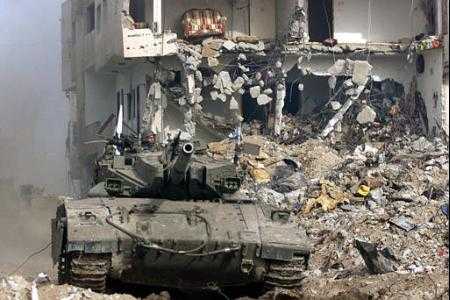The Israeli Supreme Court today ordered that the International Committee of the Red Cross (ICRC) be allowed to accompany and assist the Israeli army in locating the bodies of Palestinian fighters and civilians killed in the Jenin refugee camp. The Court recommended that the Palestine Red Crescent Society (PRCS) also be permitted to join in these activities. Although the Court dismissed the three petitions in which these issues were raised, it ordered that the ICRC and the Israeli army must identify the bodies, documenting them with photographic and other equipment in accordance with international humanitarian law. The Court also recommended that local representatives be included in the identification process. Once bodies have been located and identified, they should be given to the family members without delay in order to permit them to bury the bodies in a respectful manner according to religious customs. Due to the filing of these petitions, the anonymous and mass burials already underway were halted, and international humanitarian organizations gained access to the camp for the first time. The petitions were heard in a one-hour hearing by a three-judge panel of Chief Justice Aharon Barak and Justices Theodor Or and Dorit Beinish.
The Israeli Supreme Court today ordered that the International Committee of the Red Cross (ICRC) be allowed to accompany and assist the Israeli army in locating the bodies of Palestinian fighters and civilians killed in the Jenin refugee camp. The Court recommended that the Palestine Red Crescent Society (PRCS) also be permitted to join in these activities. Although the Court dismissed the three petitions in which these issues were raised, it ordered that the ICRC and the Israeli army must identify the bodies, documenting them with photographic and other equipment in accordance with international humanitarian law. The Court also recommended that local representatives be included in the identification process. Once bodies have been located and identified, they should be given to the family members without delay in order to permit them to bury the bodies in a respectful manner according to religious customs. Due to the filing of these petitions, the anonymous and mass burials already underway were halted, and international humanitarian organizations gained access to the camp for the first time. The petitions were heard in a one-hour hearing by a three-judge panel of Chief Justice Aharon Barak and Justices Theodor Or and Dorit Beinish.
On 12 April 2002, Adalah and LAW - The Palestinian Society for the Protection of Human Rights and the Environment filed one of the petitions under review by the Court today demanding the immediate cessation of the burial of Palestinians in mass graves in the camp. The petitioners further requested that the ICRC and the PRCS be permitted to enter the camp and remove the dead bodies, and demanded that family members of the deceased be allowed to conduct burials in a respectful manner. The petition, filed by Adalah Staff Attorney Jamil Dakwar, was joined by the Court with two similar petitions filed that same day by Members of Knesset Mohammad Barakeh and Ahmed Tibi. The ICRC and PRCS also joined as petitioners in the case.
The Court dismissed the petitions on the grounds that during the hearing, the State agreed to allow the ICRC into the camp to accompany the Israeli army and assist in the identification of the bodies. It should be noted that the position taken by the State before the Court contradicts the position it advocated in its 12 April 2002 response to the petition. In its initial response, the representative of the Attorney General stated that the Israeli army cannot permit humanitarian organizations to enter the area because some of the bodies may be booby-trapped with bombs. He added that the evacuation of bodies by the ICRC would be conditioned on their immediate burial by the families of the deceased. He also noted that the Israeli army had not yet buried any bodies, although this contradicts testimony received from eyewitnesses in the camp. The Court noted in its decision that the State did not argue this arrangement would endanger the security of the Israeli army.
While Adalah welcomes the Court's decision, the organization notes that the implementation of this ruling is dependent on the cooperation of the Israeli army with international humanitarian agencies, as well as compliance with international humanitarian law regarding the burial of the bodies. The organization calls on the Israeli army to cooperate with international humanitarian agencies and to fully comply with international humanitarian law regarding the burial of the bodies.














